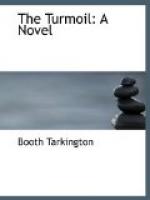But Bibbs had no glance to spare for Roscoe’s windows. He stopped for his last look back at the open door, and, with a thin mantle of white already upon his shoulders, made his way, gasping in the wind, to the lee of the sheltering wing of the New House.
A stricken George, muttering hoarsely, admitted him, and Bibbs became aware of a paroxysm within the house. Terrible sounds came from the library: Sheridan cursing as never before; his wife sobbing, her voice rising to an agonized squeal of protest upon each of a series of muffled detonations—the outrageous thumping of a bandaged hand upon wood; then Gurney, sharply imperious, “Keep your hand in that sling! Keep your hand in that sling, I say!”
“Look!” George gasped, delighted to play herald for so important a tragedy; and he renewed upon his face the ghastly expression with which he had first beheld the ruins his calamitous gesture laid before the eyes of Bibbs. “Look at ’at lamidal statue!”
Gazing down the hall, Bibbs saw heroic wreckage, seemingly Byzantine— painted colossal fragments of the shattered torso, appallingly human; and gilded and silvered heaps of magnificence strewn among ruinous palms like the spoil of a barbarians’ battle. There had been a massacre in the oasis—the Moor had been hurled headlong from his pedestal.
“He hit ’at ole lamidal statue,” said George. “Pow!”
“My father?”
“YESsuh! Pow! he hit ‘er! An’ you’ ma run tell me git doctuh quick ‘s I kin telefoam—she sho’ you’ pa goin’ bus’ a blood-vessel. He ain’t takin’ on ‘tall now. He ain’t nothin’ ’tall to what he was ‘while ago. You done miss’ it, Mist’ Bibbs. Doctuh got him all quiet’ down, to what he was. Pow! he hit’er! Yessuh!” He took Bibbs’s coat and proffered a crumpled telegraph form. “Here what come,” he said. “I pick ‘er up when he done stompin’ on ’er. You read ‘er, Mist’ Bibbs—you’ ma tell me tuhn ’er ovuh to you soon’s you come in.”
Bibbs read the telegram quickly. It was from New York and addressed to Mrs. Sheridan.




